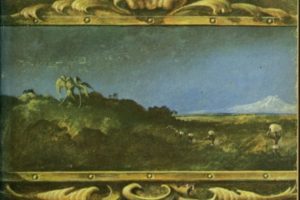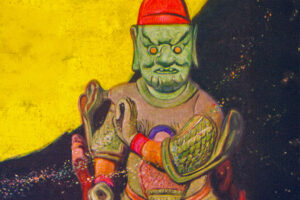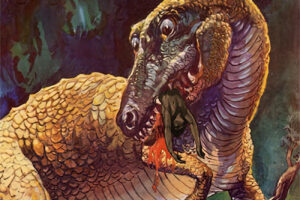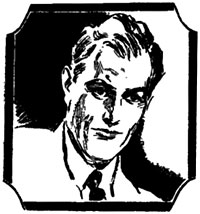
Most pulp fans know that Lester Dent (1904-1959) created and wrote Doc Savage, probably one of the most well-known pulp heroes. What they are probably less aware of are the other characters that Dent created and wrote. Before and during the time he wrote Doc Savage, he was also working on several other “gadget” heroes.
These characters include:
- Lynn Lash (1932)
- The Blond Adder (1933)
- The Crime Spectacularist (1934)
- Click Rush (1937-39)
All of these characters have been reprinted of late, and this gives us a chance to check them out.
Lynn Lash came first, before Doc was created, and it’s said that these stories helped Dent get the Doc gig. Lash was apparently created in the model of Craig Kennedy, an earlier scientific detective. Lash has two published stories and one unpublished. They appeared in 1932 in Ace’s Detective Dragnet. All three are collected in the Altus Press collection, “Hell in Boxes.”
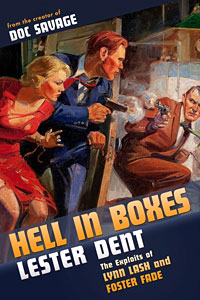 Surprisingly, after the first Lynn Lash story, Dent created further science detective stories but with different characters! Two stories are mentioned in the intro, and it would be great to read those in a collection. (I know Black Dog Books is doing Dent collections; will Altus do further Dent collections?)
Surprisingly, after the first Lynn Lash story, Dent created further science detective stories but with different characters! Two stories are mentioned in the intro, and it would be great to read those in a collection. (I know Black Dog Books is doing Dent collections; will Altus do further Dent collections?)
With Lynn Lash, why so long between stories (one at the beginning of 1932, the other toward the end)? It seems strange as noted that Dent came out with two stories with different characters, wrote a third that was later revised for his Shadow submission that got him hired for Doc. An unpublished third Lash story was returned due to a change in the format for the Detective Dragnet. Maybe the first Lash story was created originally to be a one-off character, with no intention of a continuing character, and instead the publisher wanted more, hence the second and third stories.
Lynn Lash has many elements we would see in Doc Savage. The hero worked out of a skyscraper headquarters and tackled scientific threats the police couldn’t. Lash has some association with the police, such that he gets a lot of special treatment from cops (similar to what Doc received). The source of his income is never mentioned. (Is he paid by the police? Independently wealthy? He only seems to do stuff for the police.) The third story adds some elements we see in Doc: a gun shooting mercy bullets, a special apartment with a secret elevator, a basement with special vehicles, the villain hooking up with the hero to keep an eye on the investigation, and Lash working out the solution midway, but not revealing things until the end. Sadly, there aren’t many secondary characters that are used through all the stories. The first and third stories has Lash’s boyish secretary. A reporter is the main helper in the second story, but we don’t see him in the third.
The first Lash story had a dangerous ray that a foreign power (could it be Japan?) is after. I think Doc fans will get a kick out of the villain, but I won’t give it away.
The second Lash story deals with some creature turning men into mummies! But for the mundane reason of extorting money from them. Figuring out what the creature is and who is the villain is a big part.
The third Lash story deals with a Flaming Horror (and the plot was used later by Norvell Page for a Spider novel). Again, the reveal of the villain is a big deal, as is the cause of the Flaming Horror.
Next is the Lee Nace/The Blond Adder series of five stories, published by Ace. These stories were written during the early period of Doc, but dropped due to time constraints. Altus Press has put out a great collection of these stories, “The Weird Adventures of the Blond Adder.” The cover designs for this and the Lynn Lash/Foster Fade collections match, which makes a nice pair.
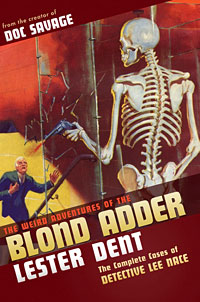 In reading the Blond Adder collection, you find out that Dent was writing those stories as he was doing Doc during his first year. The intent of the Blond Adder was to create another series character for 10 Detective Aces pulp, but Dent got burned out and had to drop it. With Lee Nace, we have another interesting gadget detective. We learn in one story that he has the training to be a doctor and a lawyer. He doesn’t care a gun (like Doc), but carries a canvas bag of equipment (which almost gives a comical element, with him lugging this around). Among some of the devices he carries are a metal skull cap that looks like his hair (like Doc uses, but here better described), knockout darts hidden in cuff-links, a Panama hat impregnated with a knockout gas, and more.
In reading the Blond Adder collection, you find out that Dent was writing those stories as he was doing Doc during his first year. The intent of the Blond Adder was to create another series character for 10 Detective Aces pulp, but Dent got burned out and had to drop it. With Lee Nace, we have another interesting gadget detective. We learn in one story that he has the training to be a doctor and a lawyer. He doesn’t care a gun (like Doc), but carries a canvas bag of equipment (which almost gives a comical element, with him lugging this around). Among some of the devices he carries are a metal skull cap that looks like his hair (like Doc uses, but here better described), knockout darts hidden in cuff-links, a Panama hat impregnated with a knockout gas, and more.
There are few supporting characters. The third story introduces Nace’s cousin, who, like Pat Savage, joins him but as an assistant. Strangely, the fact that she’s his cousin is briefly mentioned in the next story and overlooked in the final one.
Some stories almost seem a tryout for story-lines used in Doc Savage. We have a story of stolen oil from the Oklahoma oil fields, a weird meteor menace, another dealing with a green skull and a poisonous green skeleton.
Foster Fade/The Crime Spectacularist came next with three stories, which were published in early 1934 in Dell’s All Detective Magazine. The Foster Fade stories are also collected in Altus Press’s “Hell in Boxes” collection.
While the Crime Spectacularist is a gadget hero, his shtick is different. We soon learn that Foster Fade is a private detective, but one working for a newspaper called The Globe, which is a big selling “yellow journalism” paper. His beat is to find spectacular crimes and solve them, having them written up by his assistant Dinamenta “Din” Stevens, a platinum blonde writer for the paper. His gadgets (we are told the paper has two mechanics on salary creating them for him) are setup in his office and are items he carries and uses. If these are written up in the articles on him (as hinted) wouldn’t that give away a lot of their value? (This isn’t clear from the stories.)
The stories are pretty much standard detective stories. What makes them interesting are the gadgets Foster uses and the deadly schemes used in the stories (not fully explained until the end). That may be the problem with the stories. The mysteries are not very mysterious once we find out what’s going on: gun running to Latin American rebels, treasure from Chinese war lords, sunken treasure of smuggled diamonds. What makes the stories are the strange means of death: the Aroma Assassin, white-hot corpses, and dead-men with mysterious cuts on them. So I wonder why the series ended? I am surprised that these stories were published less then six months after the Blond Adder ended, considering that series was ended because Dent couldn’t handle the extra work. But he again took up the task of creating another gadget hero. Was the intention to also make this an ongoing character? To keep his name out there? Sad that it was ended so shortly due to a pushy editor, from what we read in the intro to the Altus Press collection.
Dent’s final gadget hero was Click Rush/The Gadget Man, who had 18 stories published in Street & Smith‘s Crime Busters pulp in 1937-39. These stories are seeing print in various reprints by Sanctum Books (who is reprinting Doc, The Shadow, The Avenger, and The Whisperer). To date, they’ve done five so far, and I hope they do the rest. (What would be nice would be a complete reprint of all of them, but don’t know if this will happen.)
Clickell “Click” Rush, The Gadget Man, was Dent’s last such character. He ran in Street & Smith’s Crime Busters pulp which was intended to be a sort of tryout pulp to create characters who could be spun off in their own pulp magazines (kind of like DC’s Showcase comic book). In addition to Click Rush, there was Walter Gibson‘s Norgil the Magician, Carrie Cashin, and others. But none were that successful. Click got 18 stories in the 24 issues of the pulp (later renamed Street & Smith’s Mystery Magazine, which is actually where the last story ran). He was also adapted into comic book stories in S&S’s comic books as well.
As a “gadget hero,” Click is quite different from the others. Necessary, what with Doc Savage around. He has invented many gadgets to catch crooks, and has come to New York to interest the police in them. They decline his offer. Then he meets Bufa. A large paper mache toad sitting on half a $10,000 bill. A mysterious individual uses Bufa as a radio receiver to give Click instructions to solve crimes, and if he does so, will get the rest of the $10,000 (same fee for each crime he solves). Similar to the mysterious woman who sent Jimmie Dale out on missions as the Gray Seal. This, plus the madcap humor of the series is what sets Click Rush apart from the rest. He (and we) never figures out who is behind Bufa.
All the stories were standalone, though Dent did do a three-parter. These were reprinted by Sanctum Books in “Doc Savage” #43, “The Avenger” #5, and “Doc Savage” #45. As noted, I hope they will do more Click Rush stories in their reprints.
Among the gadgets Click created are a portable x-ray device, phone-tapping equipment, a bulletproof vest, a repeating hypodermic needle he used to deliver a knockout drug, exploding matches, knockout gas vials, containers of liquefied tear gas, and a number of other gizmos that could have been created by Doc.
It’s kind of sad that considering how much a gadget-lover Dent was that he didn’t do more gadget heroes. It seems after Click Rush and Doc Savage, that was it. But we still have stories of his that we can discover and enjoy.

